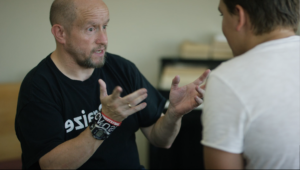
We HATE spam and promise to keep your email address safe!
Our supporters stay up-to-date on the students, staff, and things that have been happening at Rock Solid Refuge through our mailing list. Be the first to know about all things Rock Solid!
By submitting this form, you are consenting to receive marketing emails from: Rock Solid Refuge. You can revoke your consent to receive emails at any time by using the SafeUnsubscribe® link, found at the bottom of every email. Emails are serviced by Constant Contact
Other Resources
Effective Consequences
Consequences occur when a young person has violated a known boundary. It is important that your teen know both that violating…
12 Keys to Creating a Healthy Home
Creating a positive home environment for teenagers is crucial for their emotional well-being and development. Here are twelve keys…
Guidelines for Healthy Boundaries
There’s plenty that could be said about setting healthy boundaries, but here’s a few critical pieces to get you started…
The Real Issue: Why Teens Look at Pornography
 Written by James Simpson
Written by James Simpson
There comes a time when, whether it is a phone, Ipad, or computer, you are shaken to your core with the images that are set before you, images that you know your child has seen. You feel ashamed just for looking and wonder how could this happen? What do you say? How do you move forward in any discussion with your teen? You know you have to speak to them, to engage in what you have discovered, but how?
Perhaps an understanding of what your teen needs will help you engage and open the discussion that will need to happen. Teenagers need three things which are universal:
1) The need for connection
2) The need for intimacy
3) The need for value
The need for connection
People need to be connected. People cannot exist without connection, and if they do not receive it they will seek it out digitally or through social media. We live in a world where technology has made surface level connection incredibly simple, but meaningful connection incredibly difficult. Relationships matter to teens, so ask them “How connected do you feel with others?” “Why are you seeking connection on a surface level?” “What is going on inside?” These questions will open the door to thoughts and ideas that they may never have explored.
The need for intimacy
People need intimacy, and this is not strictly physical. Intimacy is far deeper; it reaches to the core of who we are. We have been told that intimacy is solely at the physical level, but this is not true. When just thought of as physical, intimacy is purely an act. If intimacy is more than an act, if it encompasses who we are, then our outlook on life changes. Humanity craves intimacy, and we cannot escape from the desire to have relationships that resonate within us. You can ask your teen “How do you understand intimacy?” or “What caused you to think of intimacy on this level?”
The need for value
People need to feel valued; that their lives matter and that they have worth. When they do not feel this, they will look for other means to receive this affirmation. If the images on a screen is the only way, then they will seek it out. This is not who they are. It is not who they were meant to be. Speak to them about this issue in their life. Explain to them that they do matter and demonstrate their worth by spending time with them. Become a safe place for them to share what they are going through. Ask your teen “Where does a person’s value come from?” and “Can a person’s value increase or decrease?” Be willing to listen to answers that don’t line up with your own.
 How to engage with your teen
How to engage with your teen
It is not easy to speak your teen, or anyone for that matter, about pornography. Pain and shame are bound up in these discussions. It will be a difficult talk, yet it is one that will need to happen. Most teens will consume more and more pornography to fill the desires that they have, and this will lead them down the road of pain and agony. Every relationship they will have will be touched by the images that they have seen. They have been taught how to treat others, and this is not easily undone.
It is tempting to put it off, to ignore the issue and hope it will go away on its own, but if this issue is not spoken it will consume your teen. It will not just go away, nor they will get over it. There are four ways to begin the process:
Beginning the Process
1) Communicate with them. Remember to ask open-ended questions. These provide your teen with an open door mentality. Use words such as “tell”, “what” or “how”.
2) Listen to your teen. Your teen needs to know that you care, letting them speak shows them that you have taken this time to hear them.
3) Speak about solutions. Your teen will be deeply ashamed, they do not need a lecture. What they will need a way out and a new path forward. Work with them to find solutions that are achievable, help them develop a plan to help them discuss what is happening inside.
4) Understand and do not criticize. This is perhaps the most difficult and will leave a lasting impression on them. You may not know all the reasons as to why, (you don’t have to) just be there for them and let them tell their story.
Please do not turn them away. They will need help on the journey to freedom and it took courage for them to speak with you. Please affirm them and tell them how proud you are of them for speaking to you about this issue.
Please note: the purpose of the questions we encourage you to ask in this article is not so you can tell your child the way the world works. Most people do not know the answers, and some answers can be wildly different depending on perspective and world view. These questions are specifically meant to open up a conversation.
We hope that this content has been informative and helpful. It is our desire to help families and bring struggling teens back together. We encourage you to share this information with others who may be in need.
Our ministry is primarily funded by our supporters, both individuals and churches, who partner with us to bring about restoration in these young men's lives. To join them in supporting Rock Solid Refuge and our ongoing ministry, please click here to donate!
Thank you for your support.



